- Home
- Brian Falkner
The Tomorrow Code Page 13
The Tomorrow Code Read online
Page 13
“Here we go,” he said, slowing the submarine down and crawling along the face of an underwater cliff. The currents were strong and volatile, throwing the small craft from side to side, but Fatboy kept the Möbius as steady as he could.
Another cliff rose on the starboard side, and Tane realized that they were in the “hole,” the short passageway that cut right through the rock of the island.
When the rock walls disappeared, Fatboy steered to the port side and held the craft steady in one spot, using the motor to adjust for the currents that threatened to drive them back into the cliff. The pinging grew in intensity, but Fatboy shook his head at Tane’s querying look.
“We are behind the island. They can’t ‘see’ us here. But better get that periscope up and let me know when they come around the point.”
Tane raised the buoy and tried to look around. It was difficult in the swelling waves, even with the gimbals that kept the camera steady.
The moonlight illuminated the edge of the island and sea beyond, but the water kept spinning the buoy around, and he had to constantly maneuver it.
The pinging surrounded them by the time Tane caught the first glimpse of the bow of the frigate, a dark silhouette against the moonlight.
“There she is!”
Fatboy was already turning the submarine, and rock surrounded them again for a moment as they ducked back through the hole in the rock.
Tane aimed his camera at the edge of the island just in time to see the stern of the frigate disappear behind it.
“What now?” he asked.
“Wait,” Fatboy replied.
Less than thirty minutes later, the ship returned, but they were through the hole to the other side of the island long before it would have been able to ping them.
“It’s like playing hide-and-seek,” Fatboy laughed.
It sort of was, but Tane still felt sick.
They stayed in the shadow of Motukokako for another hour as the pinging receded into the distance. Only then did they start the journey back to Auckland.
Tane spent most of the trip sitting on the floor by Rebecca’s bed, watching her. She woke up at one point, looked at him, and said, “Nothing makes any sense.” But most of the way she slept. She vomited once or twice and he cleaned that up and reassured her gently that she was okay.
She had held her breath for him.
BAMBI
Gazza Henderson poured the remains of his dinner onto the last embers of his fire with a hiss and a small puff of steam.
The dregs of his coffee went the same way, but there was barely enough heat left in the fire to raise a sizzle.
Technically, the campfire was illegal here deep in the bush at this time of year, but rules like that were for hikers and tourists. He had been hunting in the forests of Northland for more than twenty years and felt as at home in the bush as he did in his own living room. He certainly knew how to put out a campfire properly.
He heaped earth on top of the fire’s remains and stamped on that carefully, making sure there was no chance of residual warmth flaring up again later and causing a forest fire. He had no wish to do that. It would be like burning down his own house.
Bambi’s cold dead eyes stared up at him from beside his pack. Bambi wasn’t a fawn, like in the movie. It wasn’t even a doe. He was a buck, a hoary old stag, but Gazza always called the deer he shot “Bambi.” It was a kind of twisted joke that had started when he used to go hunting with his mate Trevor in their teens.
This Bambi was a beauty. His antlers were worth at least two hundred on the Douglas points scoring system. Plus he had the Kaipara split in the antlers, which traced his ancestry directly back to the original fallow deer released in New Zealand in 1864.
The Kaipara split wasn’t worth any extra points, but it was certainly worth a few pints in the clubrooms when he got back. Besides, he was sure that Bambi would take out the New Zealand record this year.
“Won’t you, old boy,” he said out loud. Bambi just stared at him coldly.
The sun was setting through the tall straight trunks of the kauri of the forest, and a light haze was rising as the day cooled. It softened the shadows of the trees, already elongated by the low angle of the sun, and gave the forest a quite otherworldly feeling.
Gazza debated with the dead stag for a while whether to de-head him and leave the body in the bush. He was a trophy hunter, a sportsman, he told all his mates, not a butcher, and the whole stag was a lot of weight to lug all the way back to Russell.
As he watched, the haze thickened into a light mist, swelling up around the tree ferns and rata vines. It seemed a bit unusual for this time of day. Mists were common in the early mornings, and many times he had awoken to find himself in a whitened-out world. But not usually in the evening when the land was still warm.
In fact, he couldn’t ever remember a mist through the forest at sunset like this.
The tall kauri made ghostly spires as the delicate tendrils of the fog—for it really was turning into a fog—wrapped their way around trunks and through the fanned-out leaves of the pungas. Already those trees, more than twenty or thirty meters away, were dissolving into the mist, leaving a wall of white behind the trees closer to him.
There was a vague movement in the mist, more of a stirring than anything else.
“Anybody there?” he called out. He didn’t expect there to be, but the alternatives were a deer or a Captain Cooker, one of the ferocious wild boars with razor-sharp tusks that populated the Northland forests.
He reached for his rifle but left the safety on. Hunting was a dangerous enough sport in the full light of day. But in the twilight, in a fog, it could be a death sentence. The last thing he wanted to do was shoot some innocent tramper, or another hunter, thinking it was a deer or a Cooker.
But at the same time, he didn’t want to leave himself defenseless in case a wild boar did suddenly materialize out of the mist and charge toward his little campsite.
There were more movements then, more stirrings in the mist, around and in between the trees.
“Anybody there?” he called out again curiously, but not nervously.
The mist was thickening all the time, and he could see barely a few meters now. He had a strong sense that someone or something was out there. He slid a round into the chamber of his rifle and flicked off the safety.
“I am a hunter,” he called out. This time there was a slight nervous catch in his voice. “I have a rifle. Please identify yourself.”
There was no reply, and all around him now, he had the sensation that the woods, the mist, were alive. Indefinable shapes swirled around him in the fog, ghosts amongst the trees.
A short while later, two rifle shots echoed through the tall kauri of the forest.
When Gazza hadn’t returned by Thursday, December 17, his wife, Lorna Henderson, reported him overdue. Gazza was never back late from a hunting trip.
NEW ZEALAND’S MOST WANTED
“I can’t believe,” said Tane with a serious expression, “that they fell for that corny old look-out-behind-you routine.”
“Actually it was ‘Oh my God,’” said Rebecca with a grin. She had woken up after that first miserable night feeling one hundred percent fine and full of vim and vigor, if with a slight raspy cough to remind her of her brush with death.
Tane wasn’t sure if she knew just how close she had come to dying, or what he had had to do to save her life, and he didn’t enlighten her. It was something that was probably best forgotten.
“Seriously, though,” he said with a smile, “whoever those guys were, they were tough, they were hard, they were professional combat soldiers. And yet they fell for the oldest trick in the book.”
“Who were they?” Fatboy asked, without any trace of humor. “And is there any way they can identify us?”
They were seated around the wooden dining room table of the West Harbor house. The journey back had been a slow one, creeping from bay to bay, point to point, watching, always watching for t
he sharp bow of a naval frigate. It had taken them four days, but the Möbius was now safely tucked away in the boatshed, away from prying eyes.
“No, I don’t think so,” Rebecca said.
“What about fingerprints?” Fatboy asked.
“I’ve never been fingerprinted by the police,” Tane said. “So even if they got my fingerprints on the island, they wouldn’t help.”
“I have,” Rebecca said carefully. “After the Save the Whales march. And that was going through my mind the whole time after they captured us. On the rubber boat, we had our hands tied behind our backs, and when we got on board the ship, I was careful not to touch anything. Not even the guardrail.”
Tane remembered how she had skipped lightly over it.
“What about the netting?” he asked. “When we climbed up the side of the ship.”
Fatboy shook his head. “They won’t be able to lift fingerprints off wet rope,” he said. “I am almost certain of it.”
“Which just leaves the air bottles and weight belts,” Rebecca said. “Should we go back to the island and get them?”
“Too risky,” Fatboy said. “They’ll be watching the island from now on. Better just pray they don’t find them.”
“What I think we need to work out most urgently,” Tane said, “is what they were doing there. There was minimal security when we visited the island a few weeks earlier, and then when we turn up, suddenly the entire fifth cavalry is waiting.”
Rebecca nodded. “I think something bad has happened on that island.”
“Something to do with those piles of clothes you found?” Fatboy asked.
“Maybe,” she replied, “and the broken door.”
“The soldiers might have broken that door down,” Tane said hopefully.
“From the inside?” Rebecca reminded him.
“Well, at least it’s off our shoulders now,” Fatboy said. “Now that the army and the navy are involved, it’s not our problem anymore.”
“Thank God for that,” Tane agreed.
“Maybe,” said Rebecca without conviction.
Tane looked closely at her. “Maybe?”
“It’s not up to us anymore,” Fatboy said emphatically. “We tried. We failed. Let the authorities sort it out.”
“They won’t,” Rebecca said. “Or they can’t. Or they just don’t.”
“You’ve got to be kidding,” Fatboy said. “They’ve got soldiers and scientists and…and…other stuff. Of course they can sort it out.”
Rebecca looked down at the tabletop, which was covered with copies of the almost-complete diagram, neatly printed out on crisp new sheets from their new inkjet printer.
“Tane, Fats, if the authorities are going to sort it out, then why have we been getting SOS messages from the future? They are going to fail. Just like we failed. The only people who can sort this out is us—that is, if we can figure out these messages and do the right things. In time.”
Tane caught the sting in the tail of that and glanced away.
Rebecca asked, “What about the Chronophone?”
With two computers working almost nonstop, they were quickly chewing through the backlog of BATSE data. There was now less than a third of the image to go. The plans lay tantalizingly close to completion in front of them.
“We can’t build it yet,” Fatboy said. “Not until we have the missing bit. But we could start buying some of the components.”
“Where from?” Tane asked. “The local Chronophone shop?”
Rebecca laughed, and Fatboy said, “They’re all just standard components, looking at the diagram. Resistors, transistors, diodes. We can pick them up at any RadioShack. But I’ll get a mate of mine to look over it in any case. Goony. He’s the electronics technician at the recording studio. What he doesn’t know about circuit boards is not worth knowing.”
“Will he help us build it?” Rebecca wondered out loud.
“Probably,” Fatboy replied.
“Can we trust him?” Tane asked.
“I don’t think we have any choice,” Fatboy responded. “But anyway, he doesn’t have to know what it does to assemble the components.”
“Hi, Rebecca. Hello, boys,” a new voice said, and they all looked up with somewhat guilty expressions. They hadn’t heard Rebecca’s mum come in.
“Hi, Mrs. Richards,” Tane said. “How are you feeling?”
He saw Rebecca’s cross look out of the corner of his eye.
“I’m fine, thank you, Tane. How is your mum? I haven’t seen her in such a long time.”
“Oh, she’s fine, thanks,” Tane replied.
“What’s happening on your program?” Rebecca asked conversationally, casually turning the Chronophone plans upside down on the tabletop as her mother poured herself a glass of orange juice from the fridge.
“Oh, I don’t know.” Her mum looked quite annoyed. “It’s getting hard to follow. They keep interrupting it with those blasted news reports.”
“News reports?” It was Tane who asked.
“Oh, all those cordons up past Whangarei. Mad cow disease, something like that.”
The three of them sat openmouthed as Rebecca’s mum disappeared back upstairs.
“There’s a TV in the lounge,” Rebecca said unnecessarily.
The newsreader was as smooth and polished as a greenstone tiki. They watched with increasing shock as the details of a quarantine zone were announced. A police spokesperson was interviewed and urged residents to stay calm but to avoid any unnecessary travel. Mad cow disease had been discovered on a Northland farm, a cattle disease potentially damaging to New Zealand’s dairy exports.
The main highway had been cordoned off at Kawakawa to the south of Russell and at Kerikeri to the north. All ancillary roads had also been blocked. There was no movement in or out of the quarantine zone without special permission of the police and military who were policing it.
In the same bulletin, but declared as an unrelated story, the police were searching for two teenagers and an unknown number of accomplices in connection with the disappearance of a prominent scientist from a research station in the Bay of Islands.
A photo of Professor Green was displayed, along with a potted summary of her career, followed by a police sketch of Rebecca and Tane. It wasn’t a good likeness.
“What the hell is going on?” Fatboy wanted to know when the bulletin had finished.
“Disappearance!” Rebecca’s mouth just about hit the floor. “So that’s what the soldiers meant by ‘Where are the hostages?’ They think we kidnapped Vicky!”
“And the rest of her team!” Fatboy realized.
Tane said, “But we didn’t. So who did? And what’s this about mad cow disease?”
“It’s not mad cow,” Rebecca said. “That’s just a story, to avoid panic.”
“So what is it?” Tane asked.
Rebecca said chillingly, “Isn’t it obvious? Something bad did happen on the island. The Chimera Project.”
Tane got up and turned the sound off on the TV. The sudden silence in the room seemed to take all the warmth out of the day, despite the unfettered sunshine outside.
Rebecca said, “I think we were too late. That whatever it was that we were supposed to stop has already happened.”
’TIS THE SEASON
He sees you when you’re sleeping,
He knows when you’re awake.
He knows if you’ve been bad or good,
So be good for goodness sake!
—J. Fred Coots and Haven Gillespie,
“Santa Claus Is Coming to Town”
The week leading up to Christmas was full of the noise and fun and shopping that is like no other time of the year.
Carolers sang joyously on street corners, whole streets of houses were festooned with thousands of tiny lightbulbs, and children sat fearfully on Santa’s knee in the shopping malls and asked for outrageous gifts like ponies and spaceships and magic rings that could make them fly.
Shops promised pre-Christma
s sales, large corporations sponsored nighttime light shows and drew Santa’s sleigh on the clouds in colored laser light.
Drivers and shoppers alike grew increasingly irritable as stressed-out motorists and frazzled parents gesticulated at each other over places in motorway queues, or parking spaces, or the last stock of a special-priced toy.
In other words, the year progressed just like those that preceded it, and apart from the occasional slightly disturbing news report from the north, life was pretty good.
To Tane, Rebecca, and Fatboy, it all seemed like sheer insanity.
The man in the Santa suit glanced casually over at Tane again. Too casually. For the third time.
“Let’s get out of here,” he said to Rebecca, who was comparing the component numbers on some electrical parts with the list that Fatboy had given them.
Fatboy was still circling the block. He had given up looking for a space after half an hour of trying. Kmart had a sale on and there wasn’t a free parking space this side of Western Springs.
“But we haven’t got the capacitors yet.” She frowned, running her finger along a row of small, labeled plastic bins.
“Santa Claus has been watching us for the last five minutes.”
Rebecca looked around at the man, who quickly looked away. “Might be a store detective. The way you’re acting, I’d be watching you too.”
“A store detective in a Santa suit?” Tane took a deep breath and tried to calm down. It didn’t help. A police car went past outside with its siren crying, and he accidentally knocked over an entire stand of Dummies books. He picked them up quickly, before the sales assistant could come and help.
Santa was watching them again, Tane realized, half hidden on the other side of a circular stand of electronics magazines. He was curiously thin-faced for a Santa, who was usually a chubby, jovial fellow. This Santa had a scar above one eye, not quite masked by the stuck-on bushy eyebrows. He looked like a spy in a Santa costume. Or a hired killer. Or a soldier.

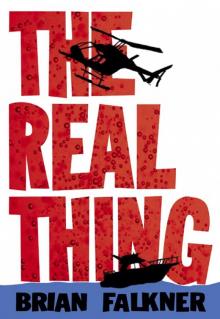 The Real Thing
The Real Thing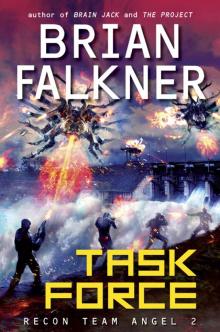 Task Force
Task Force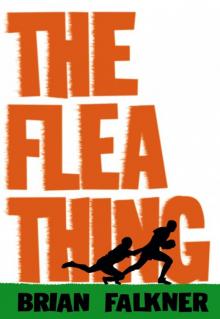 The Flea Thing
The Flea Thing The Project
The Project Clash of Empires
Clash of Empires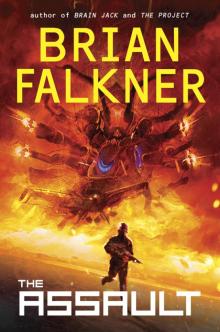 The Assault
The Assault Brain Jack
Brain Jack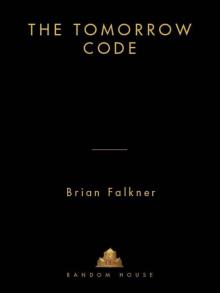 The Tomorrow Code
The Tomorrow Code Vengeance
Vengeance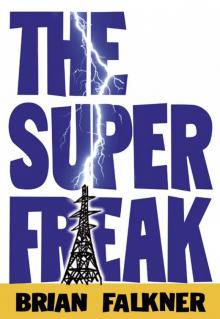 The Super Freak
The Super Freak Northwood
Northwood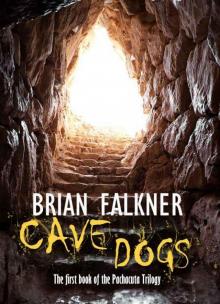 Cave Dogs (Pachacuta Book 1)
Cave Dogs (Pachacuta Book 1)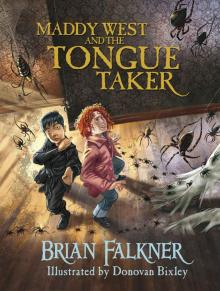 Maddy West and the Tongue Taker
Maddy West and the Tongue Taker